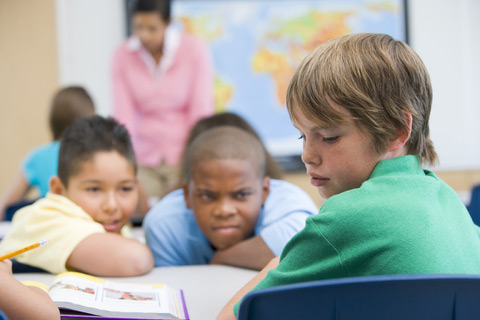Why Bully Victims Suffer in Silence

From the time she started school through sixth grade, Trish McClune was bullied. Kids called her "Tissue" and wiped their noses on her clothes. Once, her best friend punched her. Even her cousins and sister got in on the game, forming "WHEAT" — the "We Hate Everything About Trish Club."
"There were times when I'd just sit outside by myself at recess," McClune, now 31 and a communications associate in Lancaster, Pa., told LiveScience. "Just sit outside and pick the grass, because I felt like the world hated me."
Despite the torment, McClune didn't tell her mother or any other adults about the full extent of the bullying she endured. She didn't think it would do any good.
"It was like, 'What's the point?'" McClune said.
McClune's reaction isn't unusual. Studies have shown that nondisclosure is a common choice among bullying victims. Recent research has pointed to racial and cultural concerns influencing whether kids choose to tell; school structure matters, too. Often kids think telling won't do any good, or that the bully will retaliate if they tattle, said Susan Swearer, a professor of school psychology at the University of Nebraska, Lincoln.
And sometimes they're right, Swearer told LiveScience.
"Kids will tell us, 'I told what was going on and nothing happened,' or 'I told what was going on and it got worse.'" Swearer said. "So adult reaction to the bullying that's taking place is really critical."
Get the world’s most fascinating discoveries delivered straight to your inbox.
Secret bullies
The number of kids who tell someone about bullying differs based on when and where studies are done. One 1995 study published in the journal Education Canada found that among Canadian schoolchildren, about one-third of bully victims never told an adult. A 2005 study of Dutch elementary school students found that nearly half of bullying victims didn't tell their teachers about the bullying. Among Dutch children who were frequent victims, 25 percent kept their experiences from adults, the researchers reported in the journal Health Education Research.
Finally, in a 2009 survey of middle and high school students conducted by the Gay, Lesbian and Straight Education Network, 62.4 percent of bullied gay and lesbian teens did not report the harassment to school officials. Just over one-third of those who had reported the bullying said that the school staff did nothing in response.
Reasons for secrecy tend to fall into one of seven categories, according to a 2005 review of research by University of Toronto social workers. The categories, reported in the journal Children & Schools, were:
- The cloak of secrecy: Bullying often happens out of adults' sight, in settings such as hallways and school lunchrooms. Thus, bullying stays between the victim, the bully and peer bystanders.
- Power: Bullying is marked by one participant — the bully — possessing more power than the other, whether that power is real or perceived. Children learn to gain power by aggression and to accept when others wield aggressive power. So a "weak" victim is not likely to tattle.
- Self-blame: Victims may feel shame and blame themselves for their situation. One girl told the researchers she was at fault for her victimization, because she was "a little chubby."
- Retaliation: To some kids, the logic is simple: Tell an adult and make the bully madder.
- Vulnerability: Kids who are bullied are often less accepted by their peers and may struggle with social skills. They may yearn for acceptance from the very people who torment them.
- Fear of losing a friendship: Sometimes the relationship between bullies and victims isn't so straightforward. If the victim counts the bully as a friend (or wants to be his or her friend), telling may not seem like an option.
- Fear adults will do nothing: Kids may be skeptical that adults can, or will, take steps to stop a bully.
Complicating factors
On top of those reasons, the child's own characteristics may play a role. Reporting harassment may put a child in the position of having to highlight his or her own differences. For example, children of transracial adoption are often loathe to discuss racial harassment with their white parents, said Sara Docan-Morgan, a professor of communication studies at the University of Wisconsin, La Crosse.
Docan-Morgan's research, reported online Oct. 27 in the Journal of Social and Personal Relationships, finds that Korean adult adoptees with white parents often faced race-related bullying as children, but many never told their parents. Many felt their parents would never understand, being white and thus not subject to similar taunts. Others said just bringing up the bullying was painful.
"They really wanted to blend in and fit in," Docan-Morgan said. "So bringing up this topic of 'I'm being teased about my race' obviously makes them stand out and highlights the fact that they don't blend in with their families and their community."
Similar stumbling blocks could stand in the way of bullied gay and lesbian kids, said Ritch Savin-Williams, a Cornell University expert on adolescent development and sexual minority youth. Whether gay or straight, kids tend to get teased for failing to conform to gender norms, Savin-Williams said. Since the issue is fraught with homophobia, reporting this type of teasing may be especially tough for kids.
"The association is gayness," Savin-Williams said. "So a boy is probably not as likely to come up to a teacher or parent and say, 'Everyone is saying I'm a f** or I'm gay'… That's not something a straight kid or any kid who's not comfortable with identity really wants to broadcast."
Culture may also play a role: American victims tend to keep bullying secret to protect themselves, said Masaki Matsunaga, a professor of communications at Waseda University in Tokyo. They fear other people will reject or blame them. On the other hand, Japanese bully victims keep secrets to protect others, Matsunaga has found. They worry that this disclosure would cause stress for the person they're telling.
Either way, Matsunaga said, the method of drawing bullying victims out remains the same.
"The best approach to support victims, both in the U.S. and Japan, and to encourage them to open up, is to show empathy and ask about their feelings in a caring tone, rather than giving advice and suggestions about what to do," Matsunaga wrote in an e-mail to LiveScience.
Changing the system
Parents should make a point of asking their children open-ended questions about their days and listening to the responses, said the University of Nebraska's Swearer. If a kid reports bullying, Swearer said, parents should focus on solving the problem, not exacting revenge. [Read Bullies on Bullying: Why We Do It]
"Where I see things going south fast is when parents march into the school and they're irate," she said. "It really ends up not helping anybody."
Swearer sees a positive trend in the United States of schools and states enacting anti-bullying rules and laws. Still, she said, "at the individual school level, there is quite a lot of variability" in how seriously bullying is taken.
The best schools have explicit anti-bullying policies, open communication and a confidential system of reporting bullying for students, Swearer said. Given the popularity — and relative invisibility — of cyberbullying, she said, adults need to stay on top of what's happening with kids.
"It would be nice if we could move to a system where the adults and kids are talking in a way that is solution-oriented," Swearer said. "If we could be smarter at the front end about how we're dealing with this, we'd obviously be better off."
For some, however, the conviction that adults turn a blind eye to bullying is hard to shake. McClune didn't tell her mother about what happened to her until recently.
"She said, 'If I would have known it was that bad, I would have done something about it,'" McClune said. "I don't think she would have known what to do."
- Behind Bullying: Why Kids Are So Cruel
- Understanding the 10 Most Destructive Human Behaviors
- Fight, Fight, Fight: The History of Human Aggression

Stephanie Pappas is a contributing writer for Live Science, covering topics ranging from geoscience to archaeology to the human brain and behavior. She was previously a senior writer for Live Science but is now a freelancer based in Denver, Colorado, and regularly contributes to Scientific American and The Monitor, the monthly magazine of the American Psychological Association. Stephanie received a bachelor's degree in psychology from the University of South Carolina and a graduate certificate in science communication from the University of California, Santa Cruz.


